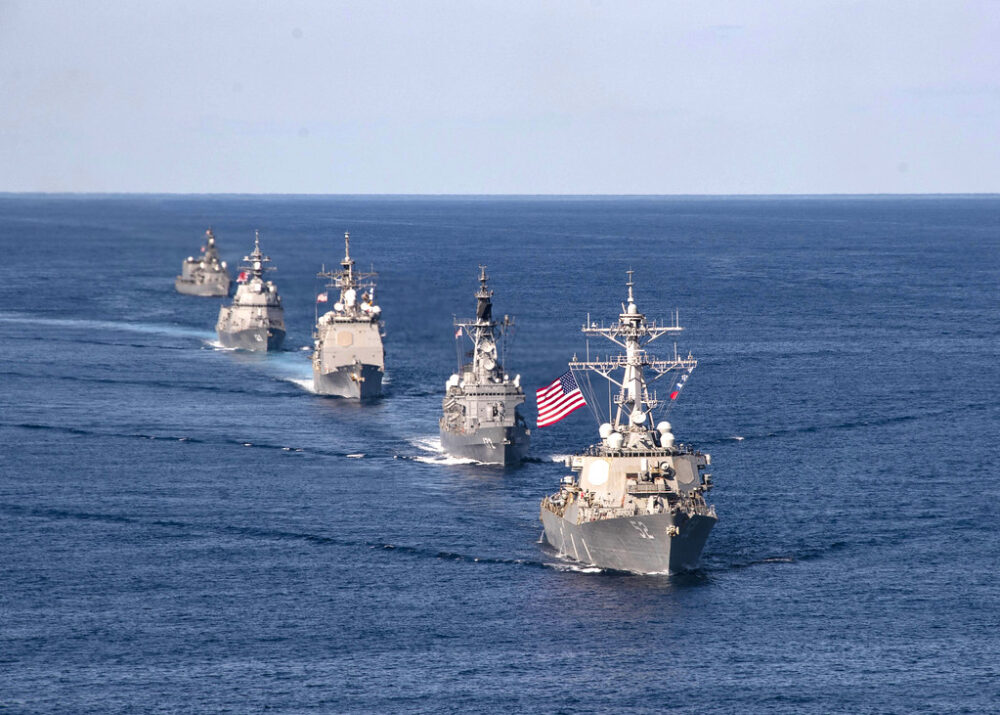I met Rob Leeper at my first co-op. When I started working, I was overwhelmed, to say the least. I did not know what I was doing or how to operate any sort of machinery for the first couple of weeks and although everyone I knew encouraged me to ask for help, it was difficult for me to do so without a pang of guilt. Rob noticed my hesitation and kindly told me “you can ask an old sailor anything.” Intrigued, I asked what he meant when he said “old sailor.” That was when he turned to me, his eyes glistening. He recounted his days in the Navy, his time away from his family, and all the lessons learned over the decades. This brief 20-minute conversation already had me hooked — I spent the next month getting to know Rob and learning his story.
Low tides: Rough beginnings
The story is of a man who started from nothing, working in a slum area, and went on to join the Navy. It was his will to survive and his penchant for electronics and building machines that allowed him to get to where he is now: one of the most ingenious mechanics at Nano-C, an MIT startup that focuses on organic solar cells and carbon nanotubes.
Rob’s story starts in Pittsburgh, Pennsylvania where he was born when his parents were in their 40s. With his father airdropped in Normandy, and his mother telling stories of the Great Depression, Rob’s childhood was anything but regular. From kindergarten to 12th grade, he had gone to 12 different schools in seven different school districts. Needless to say, friends were “not on the menu” — except for a mutt that kept a lonely boy company. Unfortunately, when Rob’s family had to move once more to a poor neighborhood in Pennsylvania, his sole companion was left behind.
It was not until fourth grade that Rob’s talent for mathematics was discovered. His teacher had accused him of cheating on long division problems — problems that even she could not solve in her head — as he was not showing his work. His father, a man hardened by his experiences in World War II, got involved. He demanded the principal make up math problems on the spot and use the desk calculator to verify the answers
“For the first time, I saw that rage used to defend me,” Rob said. as. Rob’s father then got his IQ tested, for which he scored a 136.
Rob’s penchant for fixing and building things came when his grandfather offered him an old radio that had not worked in years. Albeit young, Rob knew exactly how to take the cover off, how to clean the electrical connections, and how to fix the tubes. He now had music to ultimately “drown out the constant wail of police car sirens” from outside in the ghetto.
While school was anything but challenging, Rob’s life after graduation was when things absolutely fell apart. His long-term girlfriend left him, and he realized he was studying at a diploma mill, preventing him from furthering his education for computer-aided design (CAD). With no job and a broken heart, Rob moved to a “pre-crack den apartment” in the ghetto, where he worked the night shift at a 24-hour convenience store, selling hot dogs. He then got a job as a dishwasher at a restaurant two miles away; he wanted to escape the tirade of drunks after bars closed at night. Barely an improvement, Rob went from having a promising future to not eating every few days, waiting desperately for each paycheck. Not wanting to give up on his life, Rob did something he never imagined he would ever do: he called the Navy recruiter.
Currents: An uphill battle
Rob had actually been recruited multiple times in high school because of his score on the ASVAB test, a very challenging military exam. Although having scored in the 99th percentile, Rob turned down all the offers as he planned to work on CAD after graduation. Nevertheless, without any other viable options at this point, Rob signed up for the hardest academic program in the United States: The United States Navy Nuclear Propulsion School.
It was at this point that Rob’s true determination and will to survive emerged from within. Boot camp started in Orlando, Florida and within the first three weeks, his group of 110 recruits started dwindling. By graduation, a mere 55 remained. After boot camp, Rob entered the Navy training pipeline, where he took three classes and studied to become an Electrician. Rob could clearly remember the first day of school when the class leader came out and warned that half of them wouldn’t survive the next three months. And it wasn’t an empty threat: the class size dropped from 48 to 24. This did not stop Rob, who graduated third in the class and moved on to the Naval Nuclear Propulsion School.
“I was handed all of the piping system drawings for all of the subsystems that are involved for a nuclear reactor,” Rob recalled, from a class at the Nuclear Propulsion School. These systems were filled with intricate layouts of thousands of gauges, valves, and tanks. He had to memorize them by the following Monday.
With five more classes following the same pace and difficulty, Rob explained with a heavy heart how three classmates died by suicide within a span of just six months. This program essentially taught three and a half years of college coursework in just six months — it was beyond onerous. Again, the class was reduced by half.
Rob, however, graduated second in the class and moved to Connecticut to complete the final leg of the program: running a real nuclear reactor. With only six months to complete the operator certification, Rob had to go about the Herculean task of learning the entire reactor and understanding every particular system of the reactor. This meant that Rob would work twelve-hour day and night shifts with very few breaks in between to recuperate. In the end, it all paid off as Rob became certified within just four months and graduated first in his class. He then stayed as an instructor, where he taught about the operational nuclear reactor for three years.
Waves: Difficult times and lessons learned
When I asked Rob about his biggest challenge, he without hesitation pointed to his time in a submarine. “This is where I finally grew up and learned how to be a leader,” he said, reopening the mental box containing this difficult part of his life.
He explained how he had volunteered himself to work in a submarine during boot camp, specifically in Portsmouth, New Hampshire. Little did Rob know what was to come as he was tasked to work 460 hours over four weeks at a shipyard. He and his other fellow Navy brothers first spent weeks working tirelessly on land to repair the submarine and refuel the reactor, only to reach the most formidable part of their journey: going underwater. Rob then explained how the depths of the ocean were a true test of strength and resilience as he saw three men leave in straitjackets, doctors inject people with morphine to calm them down, and alcohol be the one place of solace as all forms of communication with family members were cut off.
Here, Rob’s tone changed from introspective to melancholic as he described the pain of not seeing his family for 182 days, including missing the birth of his youngest son. With his only family being his Navy brothers, Rob described in detail some of the tasks and skills learned from underwater missions, including burning both hands to stop a steam leak, identifying Russian and American torpedoes, and escaping both fires and floods.
After his time in the Navy, Rob finally moved to Boston where he traversed the world of office politics. Although he may no longer be in the Navy, Rob continues to use the acquired technical skills and couple them with the courage and strength gained from his experiences to help others. By working at a start-up, Rob is able to pass along his knowledge and echo his life story to prove that greatness can come from even the smallest of beginnings.
Image courtesy of Flickr


